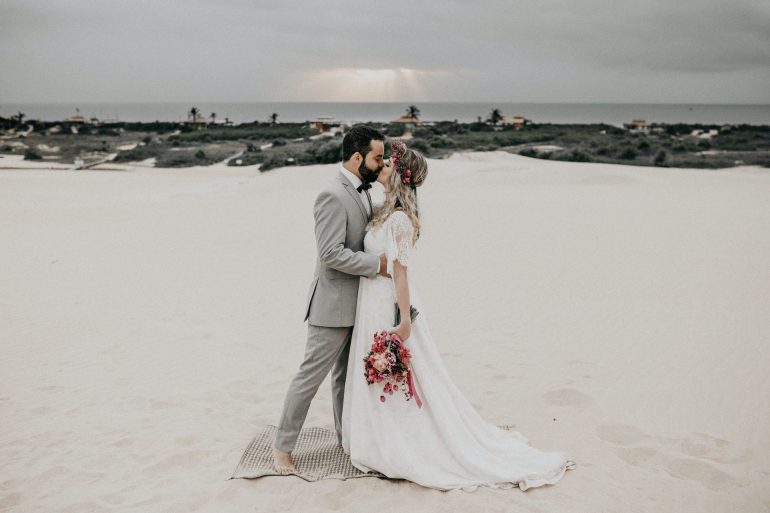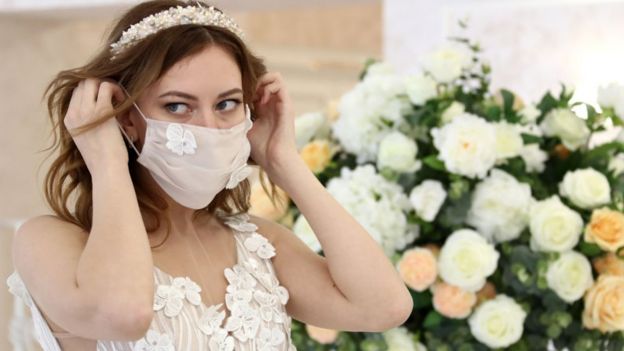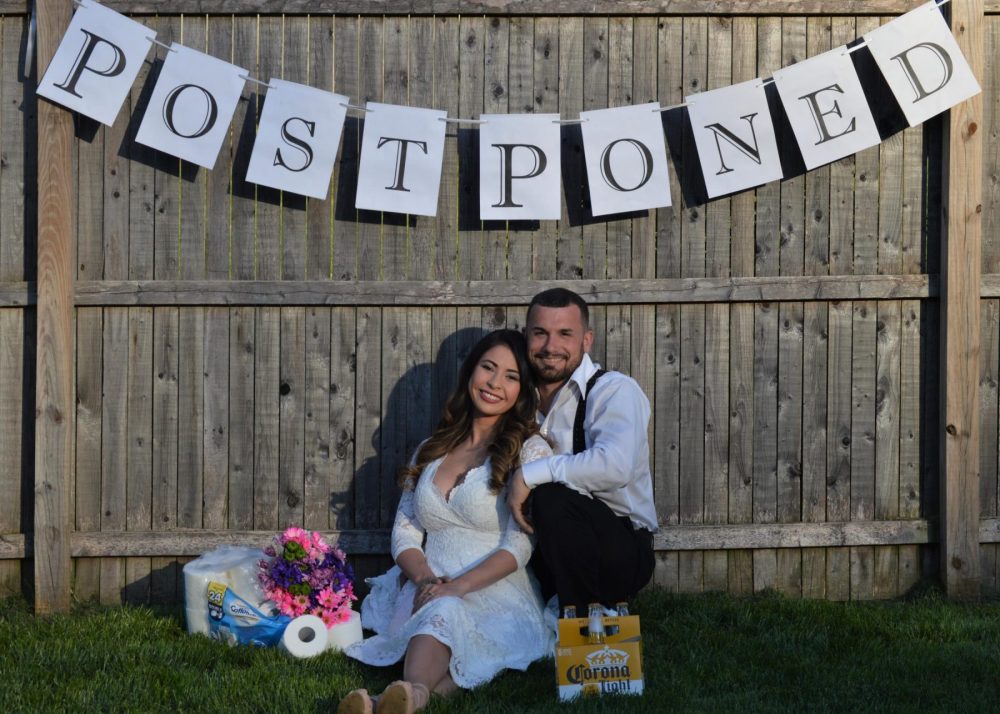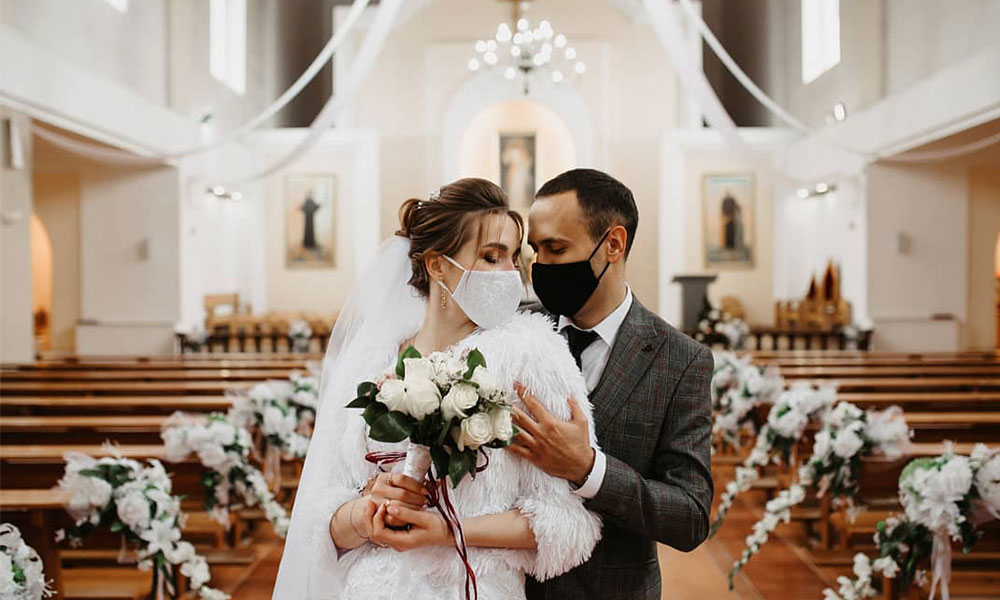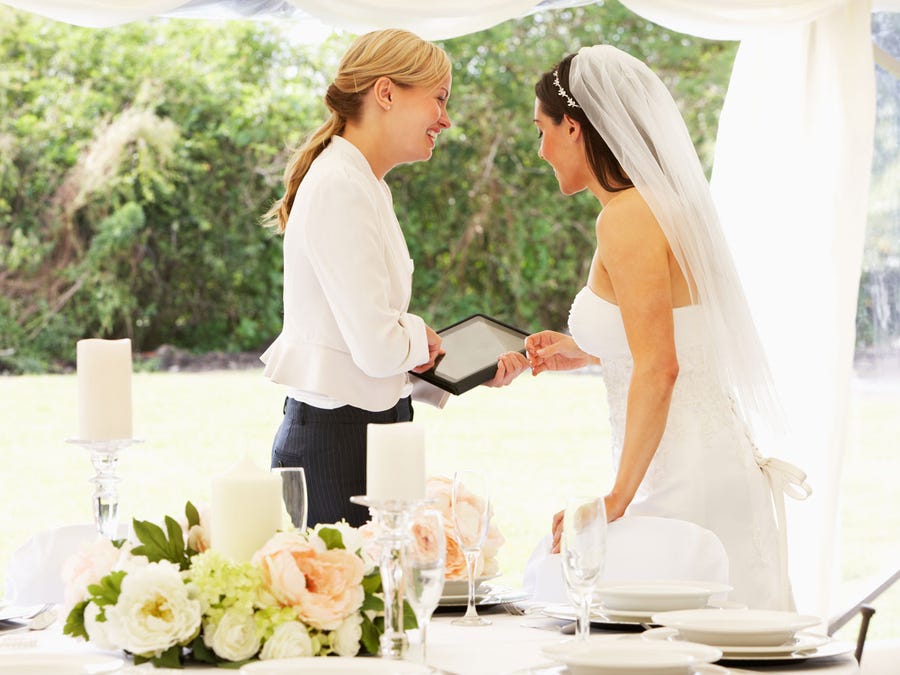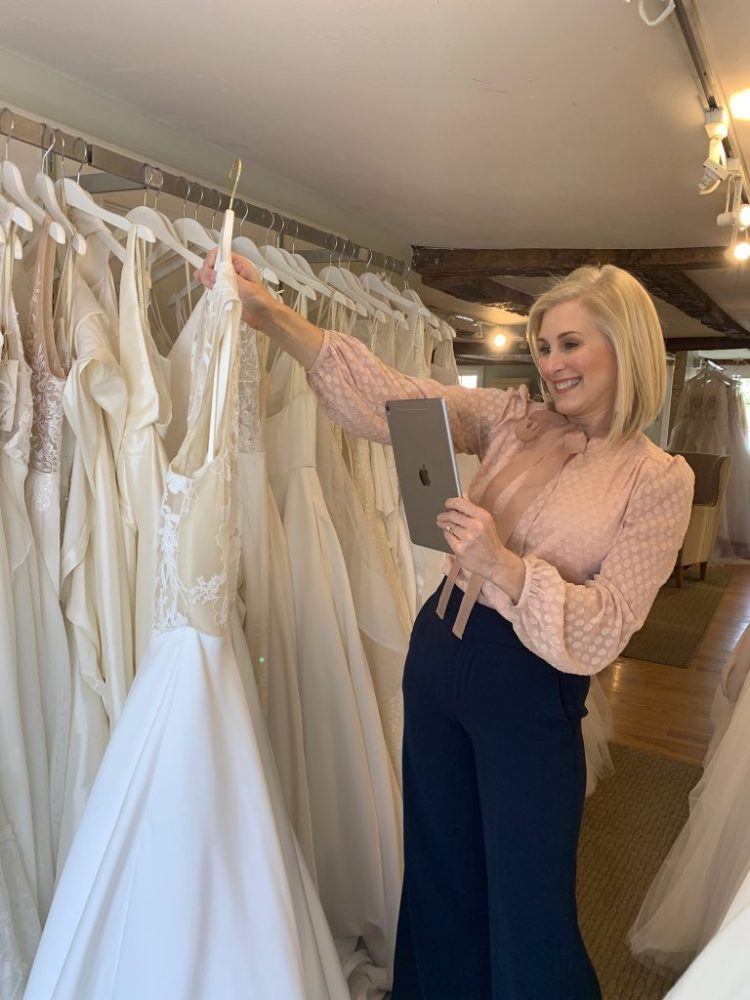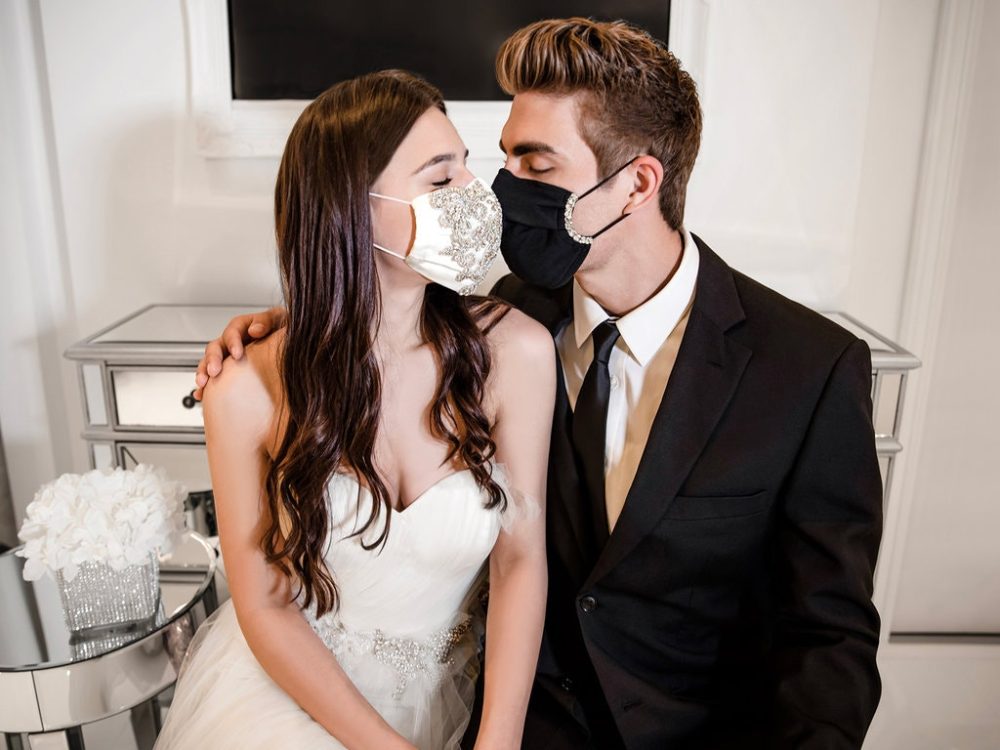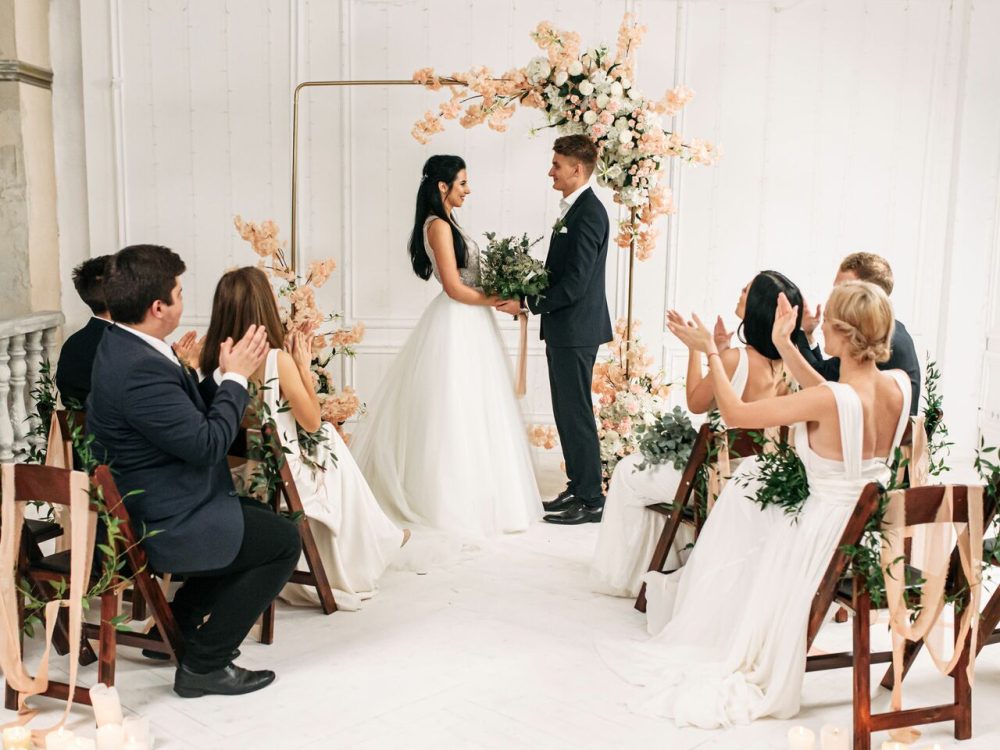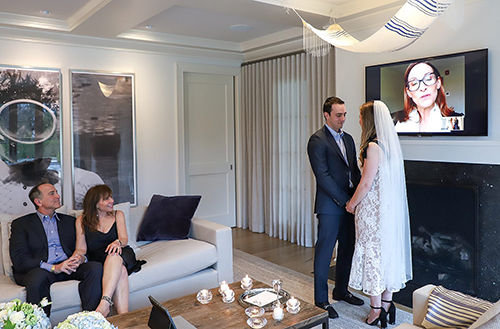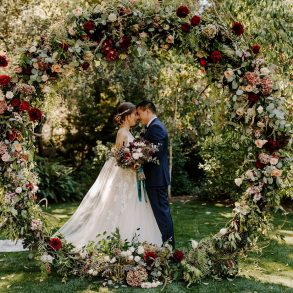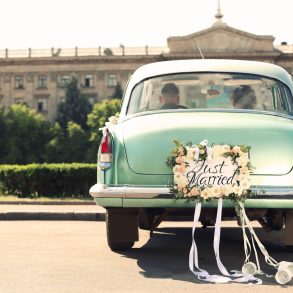If I could give 2020 a tagline or mantra for the year here’s what it would be: “We’re doing the best we can.” This is true for every single person in the entire world because COVID-19 has literally impacted everyone in some way, shape, or form. The wedding industry is no different.
Brides have had to change their vision of their dream wedding, venues are trying to find safe ways to host events, and vendors are refunding deposits and hoping to rebook their clients whenever it’s safe to do so. Never in a million years would I have guessed that the idea of attending a wedding would be scary or potentially dangerous to my health. We’d like to believe that the wedding industry will bounce back and 2021 will be magically better, but the truth is we just don’t know. We’re in uncharted territory and a lot of brides and wedding industry leaders are worried.
Courtesy: bbc.com
To put things into perspective, I’m going to hit you with some statistics that sadly aren’t too shocking. According to The Knot’s global COVID-19 survey, more than 675,000 weddings in the U.S. were affected by the coronavirus between March and June of 2020. That number is expected to hit 1-million by the end of the year. Civic Science took a survey in April and found that nearly half of U.S. adults reported being personally affected by the cancellation or postponement of a major event. During a survey of 2300 people, 16% of them knew multiple couples who had canceled or postponed their wedding.
There is some good news—the curve of the global pandemic is flattening. Retailers and restaurants are reopening, and social distancing guidelines are slowly loosening to allow larger gatherings. Brides are booking fall and winter weddings or pushing their date to 2021, so the wedding industry is seeing more revenue slowly coming in. If you’re in the process of planning or postponing your wedding, here’s a snapshot of how the wedding industry has adapted and what to expect in the future.
How Brides Are Adapting to COVID-19
It’s not easy being a bride right now. So many brides are making really tough decisions: should they cancel, postpone, elope, downsize, or play it safe? We’re definitely seeing a mix of responses from brides around the world. Some brides are not willing to wait to get married, so they’re looking into virtual or mini ceremony options or even a courthouse wedding. Other brides aren’t willing to shell out thousands of dollars for a wedding they don’t want; it’s a deal-breaker for them to not be able to hug or dance with their guests and to force everyone to wear a mask.
What it really boils down to is this: what matters most to you and your groom on your wedding day? If you’re in the middle of trying to decide what to do, here are some things to consider:
- Is there anything non-negotiable that is preventing you from changing your current wedding plans? Maybe it’s a sentimental reason like the wedding date is also the date your parents got married or a family member is sick, and you want them there for your big day.
- Can you afford to lose money on your deposits if your venue or vendors are unable to refund you? (Many of them are willing to do that now, just be sure to contact them and ask about their new policies!)
- Is your dream wedding still obtainable if you reschedule it for a later date?
Courtesy: wnpr.org
If you’ve decided to change your plans, you may have to shift your mindset. Focus on how your wedding will be now instead of how it was supposed to be. Here are some ways you can adapt your approach to wedding planning.
- With a large number of layoffs and furloughs this year, many brides aren’t willing to splurge for a wedding or honeymoon. Decide what’s financially right for you and your groom based on your situation. Many brides are choosing staycation honeymoons or saving up money for a future vacation. A few brides have even scrapped their original budget and put money towards a house instead.
- Get tech-savvy if you’re not already. A lot of your meetings and consultations will be done online so learn how to log into Zoom or Skype via desktop, laptop, or an app on your phone. You never know when or where you’ll have to fit in a digital appointment!
- Start a wedding website if you haven’t already. This is the best and easiest way to communicate with your guests about any updates, changes, or questions they may have about your wedding. Now’s a good time to also consider a digital wedding invitation with digital reply cards if you haven’t sent them out!
- Be prepared to adapt to new rules, regulations, and expectations. Vendors are slowly starting to get busy, especially as 2021 approaches, so anticipate more flexibility and patience on your end while trying to connect with your vendors.
- Rely on your wedding planner or book one ASAP. They will be your best friend while trying to navigate this new way of wedding planning. Plus, they don’t have an emotional attachment to your wedding so if you have to cancel a vendor, change your venue, or downsize your guest list they can help make those hard decisions for you.
- Be mindful of the things you’ve already bought if your original wedding date is approaching. The wedding dress you fell in love with may fit a spring wedding and an outside venue, but now you’re getting married inside this winter. Find some new accessories to adapt to the new season. Your colors may change, or you may not use some of the décor you’ve bought. Be prepared to make changes and to be okay with it. It’s a tough pill to swallow, but it will all work out in the end.
- Know your COVID-19 resources. Many bridal magazines, blogs, Facebook groups, etc. are crafting amazing content to help brides navigate this “new normal” of wedding planning. You can also find bride support groups, marketplaces to buy or sell décor and websites for wedding inspiration. Remember, you’re not alone in this!
Courtesy: dwpinsider.com
How Venues Are Adapting to COVID-19
Venue searching just isn’t the same anymore. Open houses are a thing of the past and it may be a permanent change. Brides just aren’t spending their time on physical visits and it’s just not safe. What you can expect is for virtual tours to stay around for a while. Many venues have really upped their online presence now that it’s one of the only ways to contact them.
They’re also spending time and money, if they can afford it, to expand their outdoor venue space. More outdoor weddings are being planned and it’s the safest option to allow guests to spread out. They’re also investing in extra safety precautions—signs reminding guests about social distancing and hygiene stations set up around the venue.
What you’ll also see are more package options and offerings. Venues today will be more willing to break their own rules and allow tweaks or changes to accommodate a bride and keep their business. Since Saturday wedding dates are going fast, you can expect Sundays, Friday nights, and even weekdays as new wedding date options.
Our best advice to brides on the hunt? Do your research online. Check out the venue’s website and social media platforms, find reviews from past brides, and reach out with any questions you have! Once you land on your top 3, schedule your virtual tours. Narrow it down to your top 2 and schedule in-person tours.
Courtesy: insider.com
How Vendors Are Adapting to COVID-19
Just like wedding venues, many vendors are having to change up the way they run their operations. Unfortunately, a majority of wedding vendors are small business owners, so they’ve all taken a significant hit from the wedding industry being shut down. Many have had to refund deposits and find new ways to make revenue. It’s been an emotional strain even if they’ve seen a rise in business. Here’s a look at how different vendors are changing their business.
Wedding Planners
Wedding planners are used to running the show but now they’re having to do more duties than ever. They’re negotiating more with suppliers, venues, and other vendors while making tough judgement calls and decisions on your behalf. Some wedding planners also run other special events, but those events have also been canceled or postponed so they’re really struggling to bring in new business at the moment. They’re trying more than ever to be understanding and over-communicate with their bride as much as they can.
Photographers/Videographers
A lot of photographers and videographers say their wedding inquiries have dropped tremendously, especially at the height of the pandemic. Just like wedding planners, a good portion of their income relies on weddings—many photographers were used to shooting 40-50 weddings a year.
The good news is that many couples are still booking engagement sessions, the photographer just has to get creative. They’re trying to find ways to get the shots they want without getting too close. Another source of income has been selling prints through online wedding albums. It may not be much money, but it’s something. A lot of videographers are planning to buy a drone or GoPro so they can capture more weddings at a distance.
Courtesy: thewhitedressbytheshore.com
Bridal Shops
It sounds crazy, right? How can you go dress shopping without trying on a dress? Well, say hello to virtual bridal appointments! Several bridal shops around the world are tapping into virtual reality and finding ways to cater to their brides. Some shops are sending sample dresses to the brides and allowing them to try on different styles to see what they like. Other shops are doing a virtual showroom where they have the bride send them photos of styles they like, and the consultant shows off the dress selections within the brides’ price range via Zoom or Skype. The best part is that the entourage you would’ve taken with you can still join in the fun! Have them dial in and bring their champagne (along with happy, positive attitudes) to the virtual appointment. Once you narrow down your top 2-3 picks, schedule an in-person appointment to try them on.
Brides should still be mindful that it takes months to have a dress made, especially if they’re customizing it. Give yourself time, and budget, for alterations as well. With fewer weddings on the books right now, your dress may be done sooner but the longer you push back your wedding dress shopping, the faster bridal and alteration appointments will fill up. If you don’t have a local bridal shop nearby, you can always shop online for a wedding dress!
Caterers/Bakeries
Many caterers are booked months or even years in advance, so they’re in a serious bind right now. If they agreed to cater a wedding that had to reschedule for November, December, or January, they may have a prior commitment and have to back out. If the caterer is worth their salt, they may not have a lot of open availability and are having to say no to people. If they are serving a wedding, it’s most likely not the traditional buffet-style meal. Contact-free services are a huge deal right now. That means no buffets, no serving stations, etc. More brides are opting for plated meals with a server delivering the food or small tables set up with plated food. A more casual outdoor wedding may have a food truck on-site or a picnic box lunch.
This idea of “contact-free service” is also affecting the way bartenders and bakeries operate. Bakeries are having cake samples delivered to brides at home and waiting for feedback. The financial struggle here, along with caterers, is that most of their pricing is done through headcounts. The lower the headcount, the less of a need for a large multi-tiered wedding cake. Bartenders may also be a thing of the past for a while. Instead, brides are ordering cocktails or beer in a bottle. The wedding planner will have the drinks open and set out on the table for guests to grab.
Courtesy: nytimes.com
Retailers & Dress Designers
One of the things we look forward to most in the bridal industry is the seasonal wedding line launches! We can’t wait to see what’s new and what’s trendy for the season. Due to COVID, a lot of designers are skipping the fall launch and saving up their creative juices for the spring. We have also seen gloves making a comeback as a COVID wedding staple. It’s extra protection for the bride to be covered, but also a timeless and elegant fashion accessory.
While we’re talking about accessories, we may as well address the newest accessory that is super trendy (if not mandatory) right now—MASKS. Whether you’re looking for a mask to match your bridal gown in ivory, white or lace, or coordinating with your wedding colors, retailers are making them. Winnie Couture is one of many bridal companies now selling masks in their “Haute Mask” collection. The hand-sewn cloth masks have filter pockets and are actually very beautiful. 100% of the collection’s proceeds are going to the non-profit Direct Relief; the organization is providing personal protective equipment and essential medical items to U.S. and international health workers. Other bridal companies are finding ways to give back to brides or soon-to-be brides serving on the frontlines of the global pandemic. Barcelona-based Pronovias, a wedding dress design business, launched the “Heroes Collection” initiative. The company is donating wedding dresses to brides-to-be working in the healthcare sector, including doctors, nurses, and other hospital workers.
What Do Weddings Look Like Now?
Many brides have admitted that they’re feeling less pressure now that they’re planning smaller, more intimate weddings. They’ve said that cutting their wedding list in half (or more) has been freeing and they’re spending money on only the essentials. Couples are also pressed for time, so they’re making quick decisions. We’re not saying that the wedding planning process is now completely stress-free, but a lot of brides say they’re focusing on what matters the most—marrying their man.
Courtesy: theknot.com
So, what do weddings look like now? That’s up to the bride and groom and how much of a traditional wedding they want to keep for their big day while adhering to social distancing-friendly guidelines. Many brides are getting married now and celebrating with a big party later! Elopements are on the rise as well and definitely less expensive. A drive-by wedding is also an option! Get married in a public place with you, your groom, and the minister. Then, have friends and family do a drive-by parade to wish you well on your wedding day.
If you still want a semi-traditional wedding, here are some new types of weddings we’ve seen during COVID-19:
- The “minimony” is a very short ceremony with just a handful of guests. Typically, 10-15 people are invited like close friends and immediate family.
- The “micro wedding” is a small wedding with 30-50 people including the people listed above plus a wedding party and extended family.
- The “shift wedding” is an all-day wedding where guests come in shifts to your venue. Different guests arrive in 1-hour windows and the venue coordinators clean and sanitize in between shifts. This way you get to see everyone you want and give more undivided attention to smaller groups of people.
- The “multi wedding” is similar to a shift wedding. You mix and match your guests so you can invite more people to the overall event. Maybe one group of guests attend the rehearsal dinner and ceremony, and another group attends the reception and post-wedding brunch. It’s the best of both worlds!
Courtesy: specialevents.com
Don’t rule out the virtual options for your hen party, shower, and even your ceremony! If you live in an area where bars and clubs are still closed or at limited capacity, you may need to throw a virtual bachelor/bachelorette party. Pop open the champagne, play some dance music, and share memories with your besties. Same thing for a wedding shower—have guests dress up, play digital games, and open gifts. This way everyone can attend your event without worrying about germs or trying to social distance.
Zoom or Skype video conferences are still popular options to host a virtual ceremony. Make sure all of your guests are logged in early, play some music, and have a minister marry you in front of as many virtual guests as you want. Want your digital wedding to feel more romantic? Have you and your groom write your own wedding vows!
If you are attending an in-person wedding, here are some changes you should expect:
- Some traditions may be cut altogether, including the bouquet/garter toss, group dances, and more.
- Expect more signs about keeping 6-feet away from other guests and sanitizing stations.
- The receiving line has shifted to a gesture line. Instead of hugs, kisses and handshakes be prepared for air high fives, bows, winks, and waves.
- Many couples are setting up small stations throughout their venue if space allows. These sections may have a mini dance floor, seating, and a food/drink area so guests can stay entertained while keeping their distance.
- More weddings are being live-streamed to accommodate guests who can’t attend. Just be warned that you may appear on camera at any moment!
- Masks and gloves may be provided and encouraged. If the couple has asked you to wear these items on their wedding day, please try to be respectful and adhere to their wishes.
What Does the Future of the Wedding Industry Look Like?
Overall, we can’t control the future of the wedding industry—only future brides and grooms can. The wedding industry will gradually recover but the timeline will depend on when engaged couples feel safe enough to host larger weddings.
Courtesy: forbes.com
When weddings and events do pick back up, smaller and more intimate weddings are expected. Couples are finding ways to cut costs, be unique, and non-traditional. However, some wedding experts say the opposite may happen. The multiple delays and postponements of planned 2020 events could lead to bigger and better wedding plans and expectations for 2021. No matter the size or cost of future weddings, we can anticipate a busy year ahead as people around the world are trying to make up for all the weddings, events, graduations, and birthdays that weren’t celebrated this year.

